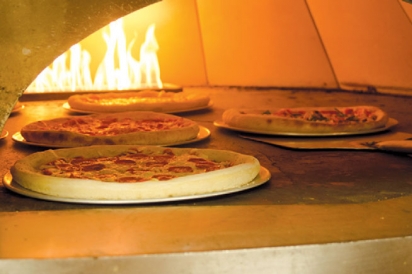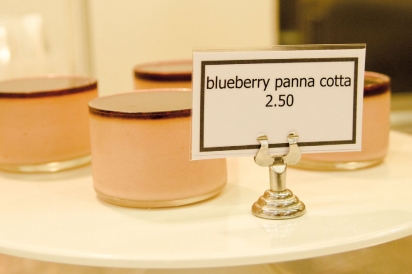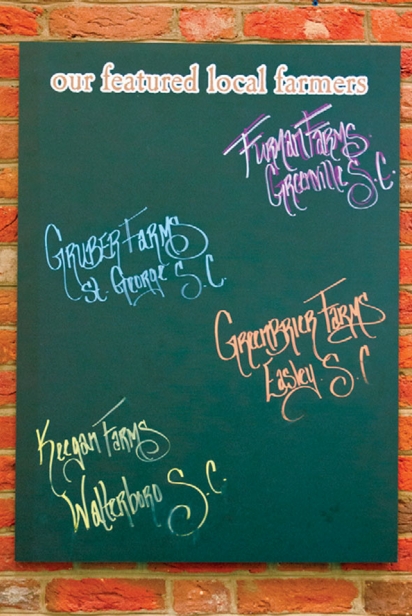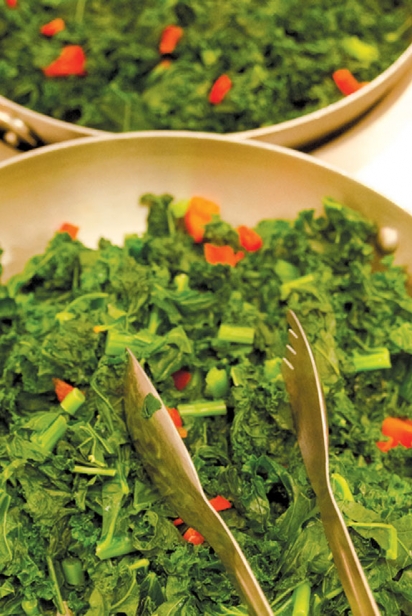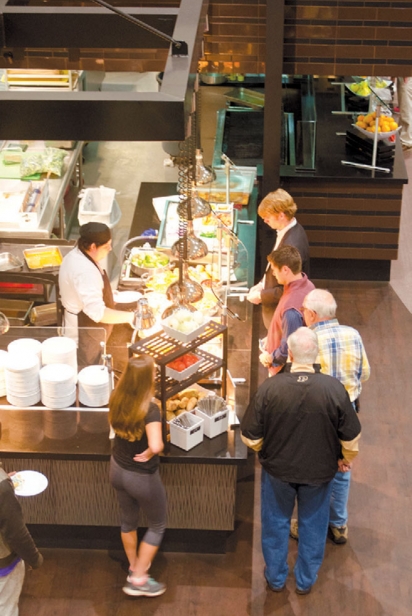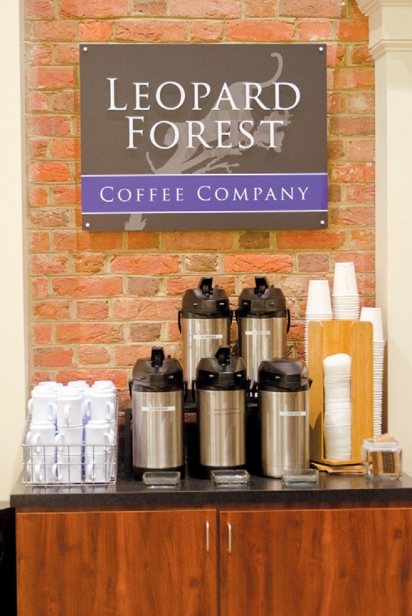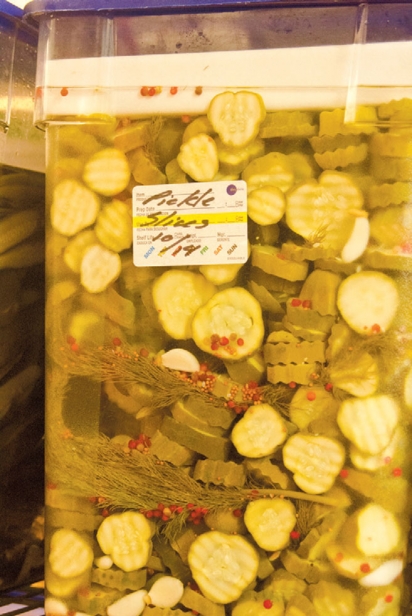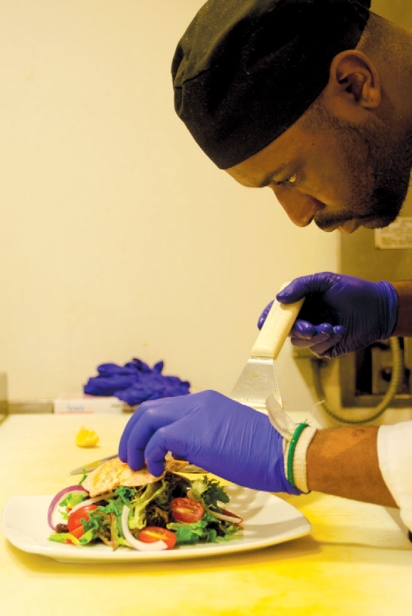The Dining Hall Comes Of Age
Sustainable Food Service With Bon Appétit Management Company
It’s personal. There is no better way to describe Bon Appétit Management Company’s philosophy. Founded in 1980s Palo Alto, Bon Appétit is an on-site restaurant company that intended, from the beginning, to redefine food service.
Becky Vuksta, Director of Auxiliary Services for Furman University, is sitting in her lakefront office when we arrive, blonde and tan, looking like she’s just stepped off the golf course. In fact, the Golf Club is one of her many responsibilities.
In 2015, Becky initiated a fourteen-month re-evaluation of Furman’s food services with the intent of finding a company that would be attuned to the needs of Furman’s students, as well as a strong partner in the University’s commitment to sustainability and ecological stewardship. A big piece of running a sustainable dining service is local sourcing. It’s easy to see why Bon Appétit was selected.
The featured coffee in the dining hall today is Leopard Forest, a brand roasted and bagged less than ten miles from campus. Products from Greenbrier Farms, also from within a ten-mile radius, are listed on the chalkboard. A container of pickles sits on the counter, scratch-made on site from Gruber Farms’ cucumbers (St. George, SC). Gruber Farms also provided the field peas and the beans for the black bean soup that is served today. The dining hall’s hormone-free milk comes from a local SC co-op.
This commitment to local and regional sourcing is a core value of Bon Appétit, and resulted in their forging a Farm to Fork program in 1999. The Foragers Program, initiated in 2010, took the Farm to Fork concept a little further with a focus on building regional foodsheds by working with smaller local producers.
When a farm or food business applies to be a vendor, a corporate team visits to ensure that the farms are producing the goods they intend to sell to Bon Appétit and that the farmers have accurately represented how the food is grown and raised. The goal company-wide is to source at least 20% of ingredients from small farms and food businesses within a 150-mile radius of each location. Whenever possible, Bon Appétit purchases products grown with sustainable and organic practices, and gladly makes last-minute adjustments to menus based on farm product availability. As part of their waste-reduction commitment, they created the IDP (imperfectly delicious produce) program; produce that might not meet the aesthetics required by farmers’ market or grocery store customers is welcomed by the chefs for use in sauces or salads.
The focus on healthy and clean food is evident in all phases of the operation. Several dispensers of agua fresca (fruit, herb or cucumber-flavored waters) are offered each day, diverting diners away from soft drinks. Spices and fresh herbs are used to flavor dishes, allowing the chefs to reduce fats, salt and sugar in menu items. If the staff needs lemon juice, they use fresh lemons, not bottled juice. Salsas and guacamole are scratch-made, as are salad dressings and soups. Staff members use fresh-cut, seasonal fruits and roast meat in house.
No GMOs, MSG or farm-raised salmon (with its dicey environmental impact), are permitted.
House-made pizza crusts are placed onto pans, topped, and slipped into a brick oven. Stocks for tomorrow’s soups sit simmering. Herb stems and vegetable pieces are used in those stocks; what’s left at the end of the process —along with other trimmings—go into a bin to be added to the composter at the Furman Student Organic Farm, which supplies produce for the dining hall.
Bon Appétit has forged many such partnerships with college farms and gardens on campuses they’ve served. In 2009, after realizing that their experience could be useful to others, they created the Student Garden Guide. The publication, produced with the help of chefs and student farmers, provided guidance for any campus garden or farm that desired to work with their food service provider. In 2011, a newly developed website (http://www.campusfarmers.org) made the wealth of farm and business information more easily accessible, while supporting a growing network of campus farmers.
Of course, there’s more to the operation than just farm-fresh produce. Healthy items are interspersed with comfort food. Chicken tenders are probably the most popular. The chefs once suggested changing the menu on Chicken Tender Tuesdays to lighter fare, but gave up the idea when students protested. (Those hundreds of chicken tenders are, incredibly, hand-breaded.) Potatoes are another favorite comfort food. By popular request, a baked potato bar was created. Diners can start with either a sweet potato or an Irish potato, and toppings run from the traditional (sour cream, chives) to the indulgent (marshmallows).
Becky Vuksta notes that the ice cream concoctions have become the menu item to watch. She’s often greeted with, “What’s the flavor today?” Angela Roberts is the person to thank for this trend. She used fresh mint from the Furman Farm to create a chocolate mint ice cream and fresh lemon juice and blueberries in another favorite. Today, the featured flavor is pumpkin pie (and yes, it’s every bit as good as it sounds).
Chef Derek Morgan (Daniel Dining Hall Manager) and Chef Chris Harris (Campus Executive Chef) also are committed to engaging the student body, which at Furman means working with a more progressive and fitness-conscious group than most. I ask a few students what they think about the new menus. One student shares that as a vegetarian, her choices used to be limited to fries and salad. Now, every day, vegetarian, vegan and gluten-free options are available. The students also appreciate the focus on quality and the reasonable portion sizes. If a student asks for two helpings of a dish, the dining hall staff encourages him/ her to come back for a second helping only after finishing the first. That practice reduces both waste and waists.
The improvement in the food is only one element of the transformation. The chefs and manager often meet with prospective students and their parents to work with special dietary needs and allay any concerns. In fact, the entire staff is conscious of major allergens and focused on either identifying the ingredients clearly or eliminating them entirely. They also examine labels carefully and drill down to areas where allergens may be hidden—in cooking spray, for example. These practices are discussed each morning at the staff meeting, along with safety reminders and customer service topics. The atmosphere is professional but congenial; everyone is actively listening. And everyone is wearing purple gloves. When I mention the level of attention to detail in branding (Furman’s colors are purple and white), Michael Brownlee, Bon Appétit’s Resident District Manager, laughs—actually, the glove color is just a coincidence.
The chefs mention an upcoming meeting with Student Council. This isn’t a required meeting, but rather a time to sit down together to see what students need and want: what could Bon Appétit do to make them happier? The chefs’ openness and receptiveness to input—from students as well as their own staff—is refreshing.
Although Bon Appétit has been a part of the Furman family for less than six months, everyone has noticed the transformation and growth in the dining hall staff. They take pride in what they’re doing because they’ve been given creative freedom and positive feedback. If someone says, “Could we make . . .?” or “What would you think about changing this dish to include . . . ?” The answer is yes. That atmosphere creates a sense of ownership and pride.
The positive energy and innovation have resulted in more dining hall visitors, especially at breakfast and dinner. The presentation of the food, along with the use of seasonal fruits and vegetables, has drawn in more diners from OLLI and The Woodlands. Tables of students are interspersed with retirees, faculty, staff and community members. The increase in older diners interacting with the students is creating the kind of progressive and inclusive environment you’d find in a cohousing community.
I opt for the rosemary rice (lightly perfumed), the bleu cheese mashed potatoes (rich but subtle), and the kale (very lightly steamed). While I’m tempted to focus only on the delicious food before me, I’m reminded that Bon Appétit’s leadership and forward thinking has affected issues in our culture that are even more basic and profound. They were the first food service company to partner with the Coalition of Immokalee Workers, featured in the film “Food Chains,” a movie focused on the human costs of food production and on the subhuman conditions in which many farmworkers live.
Bon Appétit also was a founding member of the Equitable Food Initiative, the purpose of which is to allow farm workers to have a “greater voice” and to promote environmental stewardship and safe food production. Their participation in the development of The Inventory of Farmworker Issues and Protections in the United States, published in 2011 on Cesar Chavez Day, was ground-breaking. That publication details the dirty secrets of the (industrial) farming world: low wages, deplorable working conditions, and lax enforcement of the few regulations that do exist. The most telling sentence is this: For the public, farmworker issues fall into a black hole that could be labeled “No data, no problem.” In other words, as a society, we have a “don’t ask, don’t tell” attitude toward how our food is produced. But Bon Appétit asked — and told.
The theme of ecological stewardship seems fitting as we arrive at another Bon Appétit operation, this one at Milliken Headquarters in Spartanburg. The land on which the Milliken campus is located is a nationally-recognized arboretum, formerly a peach orchard. Bon Appétit has been the on-site restaurant here since October 2015 and serves about five hundred customers a day, through breakfast, lunch and on-site catering. They are in constant communication with Milliken, sending out surveys and determining what’s working and what employees would like to change.
The café is sleek and inviting. We immediately notice the signs advising diners to eat a rainbow of colorful plants, vary their protein routine, control portions. Other signs remind us that Bon Appétit-prepared animal proteins are antibiotic-free, that pork is purchased from farmers who do not use gestational crates, and that some entire meals are certified humane.
Manager Mariah Morrissey sources from some of the same farms used by the Furman staff, most notably Greenbrier and Gruber, but she also purchases Hickory Nut Gap meats, Belue Farms’ fig preserves, and Little River Roasting coffee; the latter two are located just minutes from Milliken.
Here, too, comfort food nestles next to healthier choices. Hamburgers made from certified humanely-raised beef are cooked to order. Wild-caught salmon is seared as you wait and placed over a bed of fresh greens. House-made pimento cheese and bacon are folded into wraps.
The salad bar at Milliken uses local lettuce whenever possible. In addition to the bar, employees can choose from four composed salads, which include fresh fruit and whole grain options. Vegan or vegetarian choices, as well as gluten-free options, are available every day. The marsala station offers a window into the wonderfully creative and flexible possibilities that come with a commitment to accommodating a diversity of needs. Employees can choose to have the marsala sauce served over noodles, chicken, tempeh or a combination.
Bon Appétit even offers vegan “butters” and vegan cookies. Keri Higgins, the pastry chef, bakes all the desserts and breads from scratch. Today, she’s created raspberry cream in chocolate cups, blueberry panna cotta, pumpkin panna cotta and chocolate peanut butter cake. All of these desserts would be at home in the display case of a high-end bakery.
Like at all Bon Appétit locations, the soups and stocks are made from scratch. Each day, a broth-based vegetarian option is offered. In addition to vegetable soup today, the café has prepared steak & wild rice soup. Uncertain about which you’d like to have for lunch? Sampling is encouraged.
When I ask Mariah what excites her personally, she says it’s sourcing locally, providing really fresh food, and offering a fine dining experience for people who are unable to (or prefer not to) go out to lunch. Fine dining, indeed. Tori Littlejohn, who creates the specials in the grill area each day, is grinning broadly as he hands me a plate of today’s chicken enchiladas with scratch-made apple ancho sauce, tomatillo salsa and queso fresco, garnished with fresh jalapeno slices. He plates his entrees like a chef in a 5-star restaurant. In fact, this is one of the best meals I’ve had in a while.
The fact that employees are given the freedom to create new dishes and tweak old ones explains the pride the chefs take in their work. They certainly aren’t dishing up instant mashed potatoes. All of the values come from the top down, Mariah says, and are followed at every stage. That makes Bon Appétit a truly sustainable operation; knowledge and values are not dependent on only one person, one level or one location.
Mariah was so impressed with Bon Appétit Management Company that she recruited Keri from a previous employer. That was a good move. As we’re finishing lunch, Mariah leans over and hands us two large and luscious chocolate chip cookies. “For the road,” she says, smiling. (At least they made it back to our cars.)
Bon Appétit
http://www.cafebonappetit.com





